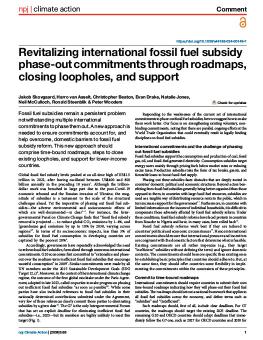
Revitalizing International Fossil Fuel Subsidy Phase-Out Commitments Through Roadmaps, Closing Loopholes, and Support
Fossil fuel subsidies remain a persistent problem notwithstanding multiple international commitments to phase them out. A new approach is needed to ensure commitments account for, and help overcome, domestic barriers to fossil fuel subsidy reform. This new approach should comprise time-bound roadmaps, steps to close existing loopholes, and support for lower-income countries.
-
Fossil fuel subsidies have environmental & economic risks. Although G7, G20, & UNFCCC meetings have promised reform, in 2022, subsidies hit a record USD 1.5 trillion. New research calls for a "standstill" policy on fossil fuel subsidies & time-bound roadmaps.
-
International fossil fuel subsidy reform commitments need national roadmaps. Leading experts present a new approach to strengthen existing commitments, close loopholes, & support low-income countries.
-
Fossil fuel subsidies remain a persistent problem despite more than a decade of commitments promising reform. In npj Climate Action, experts propose a new approach focused on national roadmaps, closing loopholes, and support for low-income countries.
International commitments to reform fossil fuel subsidies have been in place for over a decade, yet implementation continues to fall short with global subsidies hitting an all-time high of USD 1.5 trillion in 2022.
Against this backdrop researchers present a new approach to revitalize international fossil fuel subsidy commitments. Published in npj Climate Action, they outline recommendations for policy-makers with a focus on time-bound domestic roadmaps, closing loopholes, and increasing support for lower-income countries.
The authors find that to account for national circumstances, international commitments should require domestic roadmaps for phasing out fossil fuel subsidies. Roadmaps should be time bound with clear deadlines and milestones and require biannual reporting on progress. Countries should also agree to a "standstill" policy, committing to no new fossil fuel subsidies.
To close loopholes, countries should consider all fossil fuel subsidies to be inefficient unless proven otherwise. Governments should therefore justify any "efficient" subsidy. A major stumbling block for fossil fuel subsidy reform in lower-income countries is inadequate resources. To address this challenge, countries should identify finance and technical assistance needs in roadmaps with industrialized countries or multilateral development banks providing investment as steps are taken.
This new approach provides the necessary flexibility to address domestic obstacles to phasing out fossil fuel subsidies while strengthening international commitments.
You might also be interested in
The G7 Should Lead the Transition Away from Fossil Fuels. Here’s how
At the upcoming G7 Leaders' Summit, there is a critical opportunity to consolidate and strengthen their progress on the energy transition, including on fossil fuel phase-out.
What the G7 Ministerial Could Have Delivered on Fossil Fuel Subsidies Reform
The G7 climate, energy, and environment ministers’ meeting in Turin fell short when it came to breaking the 15 years of gridlock on fossil fuel subsidies. Here are three ways the G7 can use their next meetings to demonstrate measurable progress.
Burning Billions: Record public money for fossil fuels impeding climate action
This briefing provides the latest evidence on how the world is aligning public financial flows with the need to reduce GHG emissions.
Ending Export Credits for Oil and Gas: How OECD countries can end 2024 with a climate win
For a year now, Organisation of Petroleum Exporting Countries (OECD) governments have been negotiating an agreement that could put an end to oil and gas export finance. Following the acrimony in Baku, this would be a very real way for the OECD to show policy coherence, respond to calls from the poorest countries to stop subsidizing fossil fuels, and shift public finance to solutions.